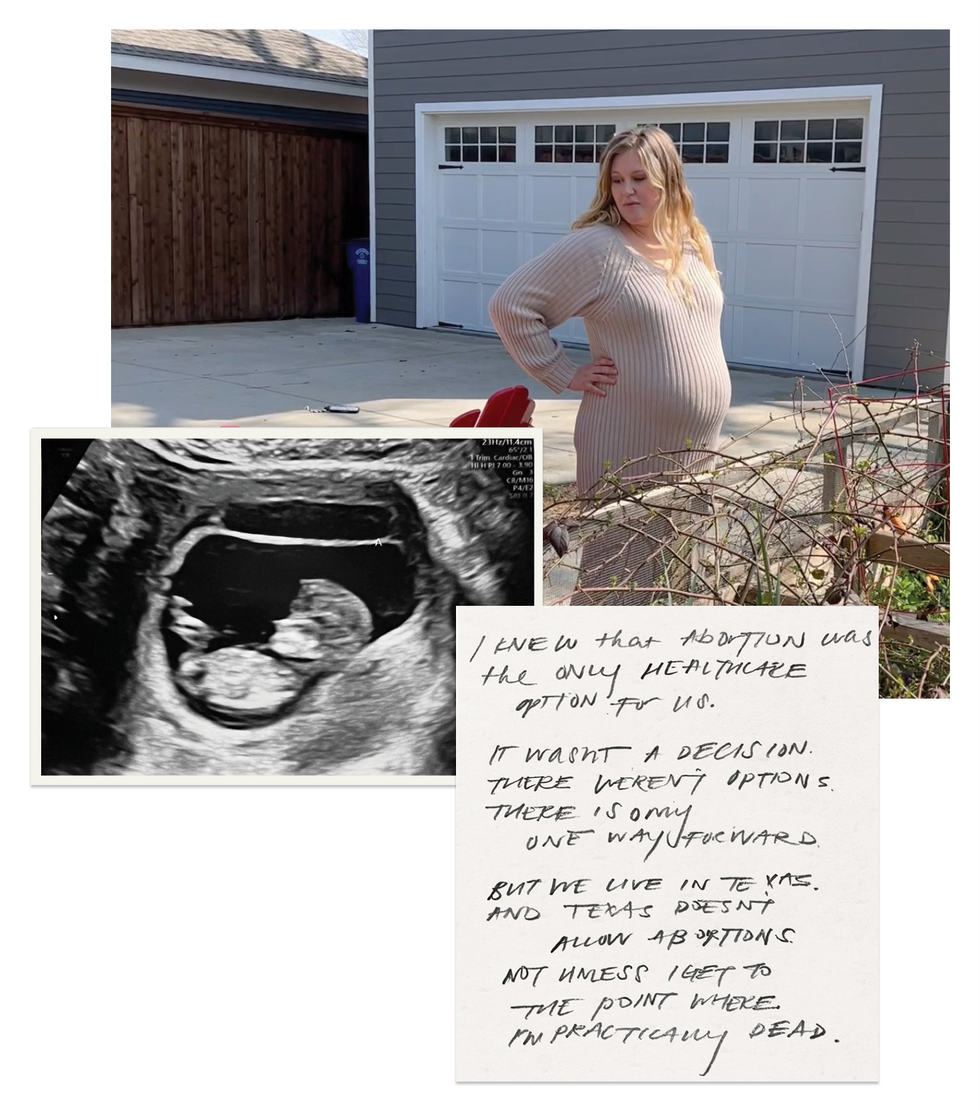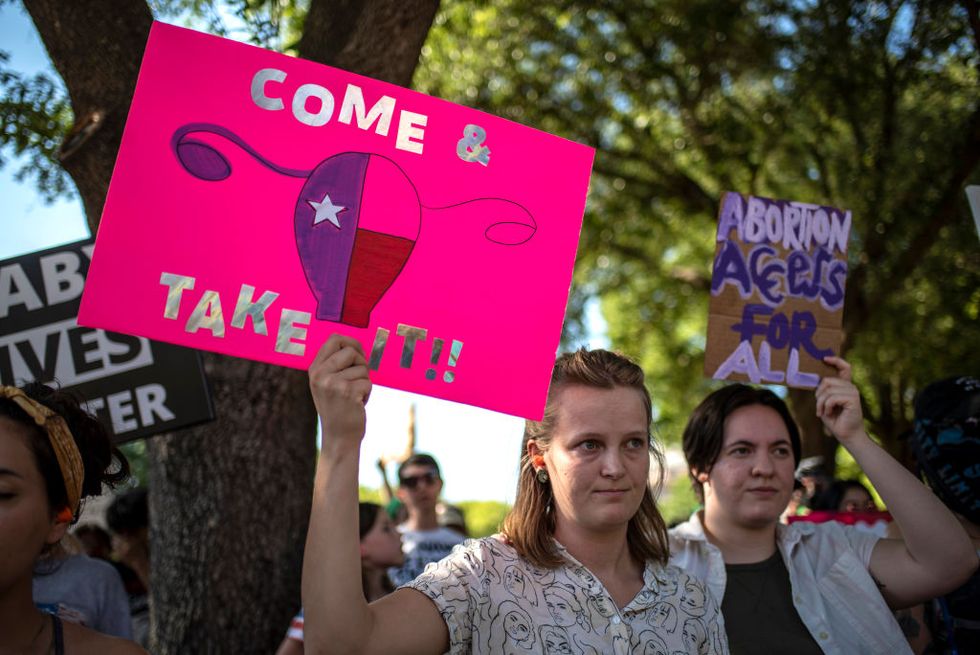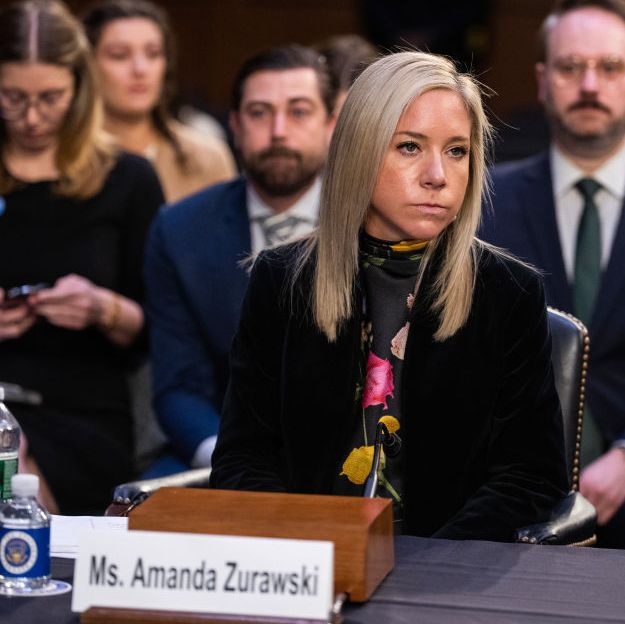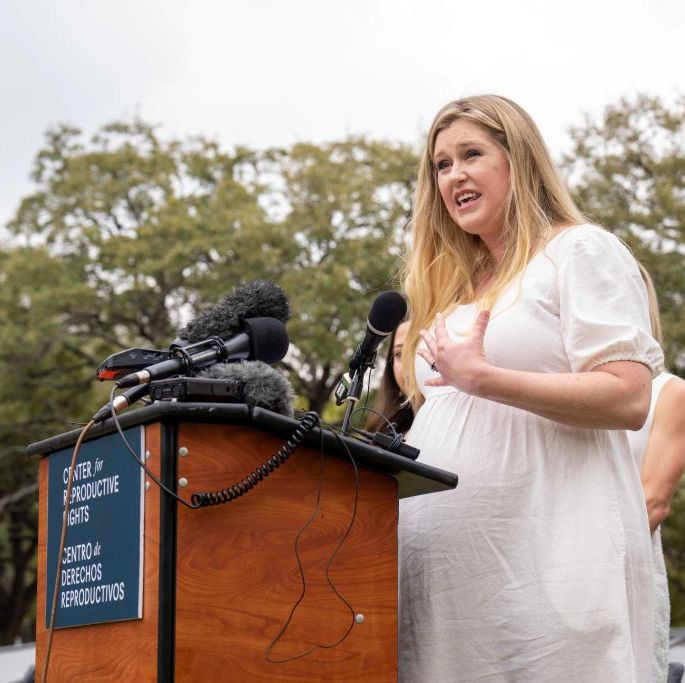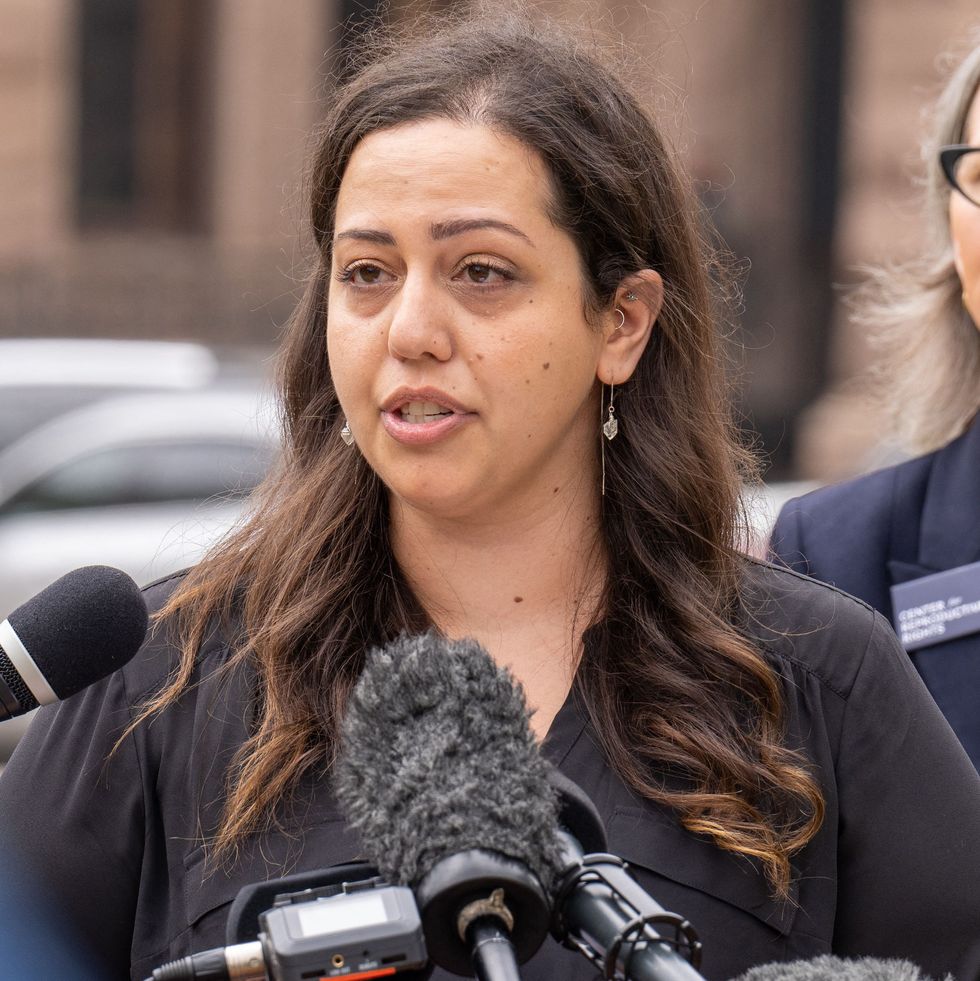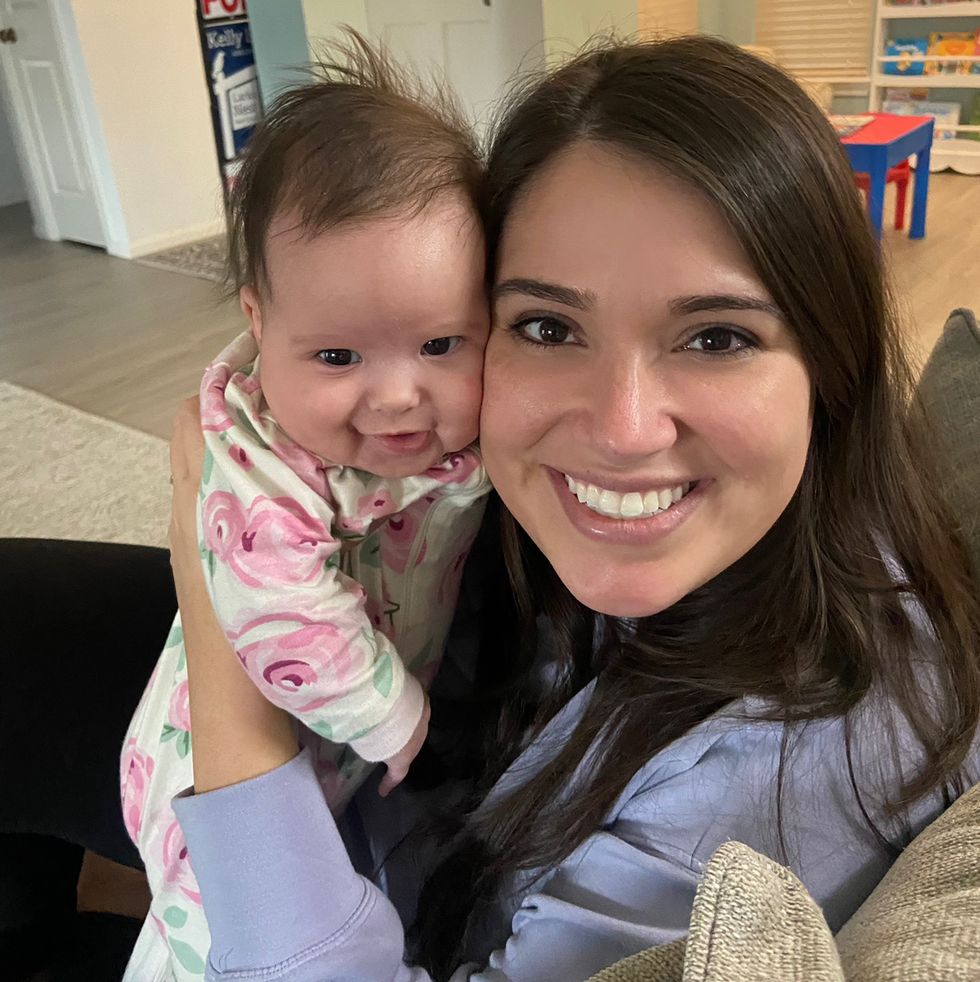It didn’t look like much. Just a fuzzy gray dot on the ultrasound. But the speck was an early sign that one of Ashley Brandt’s twins had acrania, a rare neurological disorder that is 100 percent lethal. Brandt needed to abort the unviable fetus in order to increase the other twin’s chance of survival. Because she lived in Texas, Brandt had to furtively cross state lines in order to receive abortion care at 14 weeks pregnant. “It was all hush-hush, very secretive,” she says now.
Back home, doctors wouldn’t acknowledge what had happened, and her medical records incorrectly listed a “spontaneous abortion,” the medical term for a miscarriage. Now, on the other side with a healthy eight-month-old baby girl, Brandt is done being made to feel afraid—and guilty. “There’s nothing anyone can say to make me feel bad,” she says. “It saved my daughter’s life. She wouldn’t be here if I didn’t have an abortion.”
Brandt is one of 15 women suing the state of Texas. Thirteen of those women, including one who is an obstetrician herself, were refused abortion care despite complications that made it unsafe or even deadly to stay pregnant. Two others are OB-GYNs suing because they say the law bars them from offering necessary care to their patients. The lead plaintiff, Amanda Zurawski, became septic before her life was deemed at risk enough for an abortion. “I was dying, essentially,” Zurawski says.
The lawsuit, backed by the Center for Reproductive Rights, is the first case against a state brought by people whose pregnancies were directly impacted by abortion restrictions implemented in the wake of the Supreme Court’s decision in Dobbs v. Jackson Women’s Health Organization, which overruled Roe v. Wade. In March, a spokesperson for impeached Texas Attorney General Ken Paxton responded to the suit by reiterating a statement he gave after the Dobbs ruling, saying that the law in Texas “protects women facing life-threatening physical conditions resulting from pregnancy complications.”
In theory, Texas law allows doctors to make certain exceptions when the life of the mother is at risk—but it’s extremely difficult for physicians to discern what falls within those parameters, or if the pregnancy poses substantial harm to a woman’s health. The reality in Texas has turned into a bizarre dystopian medical gray area that weighs heavily on the consciences of doctors, and perpetuates a “climate of fear,” says plaintiff Lauren Miller.
Potential penalties—including threats of prison sentences, losing their medical licenses, and fines no less than $100,000—are scaring doctors from even mentioning the word abortion. And private citizens in Texas can sue anyone who “aids or abets” in an abortion after six weeks of pregnancy.
America isn’t going backward. This is something we haven’t encountered: a new era in which maternal health care is criminalized and under surveillance—particularly if you’re poor, queer, a person of color, or trapped in an abusive relationship that leaves you more vulnerable under these laws.
One year ago this week, the Supreme Court overturned Roe v. Wade, declaring that the constitutional right to an abortion—upheld for nearly a half century—no longer exists. To mark the anniversary, ELLE spoke to Amanda Zurawski, Lauren Miller, Anna Zargarian, and Ashley Brandt, who all defy misleading perceptions about abortion seekers. Ranging in age from late twenties to mid-thirties, some married with children already, each wanted to be pregnant. “Our [family’s] circumstances put us in a position where we could fight back,” Miller says.
Now, the women have become a symbol of resistance in the fight for abortion care; Zurawski even met with Vice President Kamala Harris to tell her directly about her experience. “Since the Supreme Court overturned Roe v. Wade, extremist elected officials continue to undermine and attack women’s rights, putting their political agenda between a woman and her health care provider,” Harris tells ELLE. “The consequences of these laws have been heart-wrenching. Women’s lives and health have been put at risk, as health care is denied because doctors fear prosecution for doing their job. Women have been turned away from emergency rooms and denied treatment that is essential—or forced to travel from their home to receive care. I applaud the courageous women who are fighting for our rights, and I am grateful to have met one of the plaintiffs in the lawsuit against the state of Texas, Amanda, to hear directly about the dangerous situation she was put in. Some of these women almost lost their lives when they were denied health care because of the state’s abortion bans, and their stories represent the experiences of too many. This fight is about defending our rights, protecting our freedoms, and ensuring all Americans have access to the health care they need.”
Their lawsuit seeks to clarify how and when doctors can provide “medical emergency” exceptions for abortion under Texas law. But perhaps its greater purpose is the message it sends to the public. By taking on Texas, these women hope to protect others from the pain, fear, and paranoia they all endured. “It would be a lot easier to move somewhere else, but Texas is my home,” Zurawski says. “We can’t let them bully us. We can’t let them take our rights from us and just run away.”
Amanda
Amanda Zurawski, based in Austin, had a brush with death before doctors could medically intervene.
Texas was in the middle of a heat wave, but Amanda Zurawski was freezing cold. “I was bundled up in as many blankets as I could find, and so weak,” she remembers. Until then, her pregnancy had been “pretty smooth sailing,” she says. “Then, just a day shy of 18 weeks, I had some weird symptoms and I messaged my OB-GYN just to be safe, and they were like, ‘you need to come in right away.’” She now knows that the strange symptoms were actually her amniotic fluid leaking and her cervix dilating prematurely.
Zurawski was diagnosed with an incompetent cervix. She was going to lose the baby, but because of the law in Texas, doctors “couldn’t intervene medically,” she says, “so I had to just sit and wait until either the baby’s heart stopped beating or I became so sick that they considered my life at risk [enough] to provide standard health care.”
It took three days, multiple warning signs for the risk of serious infection, and then a sepsis diagnosis for doctors to perform the abortion. “When they realized how bad I was, the nurse came in to insert my IV…but was so flustered that she couldn’t get the IV in,” says Zurawski. “My husband said she was visibly shaken by my condition.”
Zurawski survived, but one of her fallopian tubes is permanently closed due to complications from infection, compromising her future ability to have children. “Trying to navigate [my grief] while also trying to have a baby…is really hard,” she says. Zurawski has since undergone several rounds of in vitro fertilization treatments in hopes of starting a family. “I had to go to the hospital to get blood work done, and I was immediately transported back,” she says. “There’s so much trauma, and it’s something that’s going to be with me forever.”
Lauren
Lauren Miller, located in Dallas, was faced with a nightmare scenario after discovering one of her twins had a deadly condition.
The first day of Lauren Miller’s pregnancy was dated as June 24, 2022, the same day the Roe decision was overturned. “Ironic, right?” she says now. Miller and her husband, already parents to a 20-month-old, had been trying for a second baby and were “pleasantly surprised” it happened so quickly. But this was nothing like Miller’s first pregnancy. “Nausea, fatigue,” she remembers. “Somewhere between six and eight weeks pregnant, I ended up in the ER, because it was over 36 hours of non-stop vomiting.”
An ultrasound revealed why. “The ER doctor was like, ‘you’re having twins!” Miller says. “My husband said, ‘Whoa, we’re going to need a bigger car.’” There was a moment of shock, then excitement. But at 12 weeks, that excitement turned to panic. One twin showed signs of Edwards’ syndrome, a chromosomal abnormality that is almost always fatal before birth. Despite the death sentence, none of Miller’s doctors would advise her on what to do.
“Imagine having cancer, and they’re like, ‘Oh yeah, this is going to kill you, but we can’t tell you what to do, and we’re not going to talk about chemo or surgery,’” she says. Not only was the healthy fetus also at risk, so was Miller. Still, she received little medical advice. One genetic counselor even offered an apology. “They apologized to me, because they said they couldn’t tell us our options anymore,” says Miller.
What was becoming increasingly apparent was that Miller needed an abortion—and she would have to leave Texas to get it. “It’s this very surreal, fleeing-in-the-night kind of feeling,” Miller says of boarding a plane to Colorado for a single fetal reduction. “It was very strange going through the airport where I was visibly pregnant, [it] felt like I was being tracked.” Even weeks after giving birth to the surviving twin, Miller couldn’t shake the feeling she was being watched. “The laws are designed to make people scared and nervous, and to turn people against one another.”
Anna
Anna Zargarian, who resides in Austin, had no choice but to leave Texas in order to preserve her future fertility.
Anna Zargarian and her now-husband were “ecstatic” to find out they were expecting in September 2021. Then, at just over 19 weeks, Zargarian says she “felt like something was coming out.” It was her water breaking, putting her at severe risk of developing a life-threatening infection. Survival for her fetus was also impossible—but it still wasn’t enough to take action. “The ER doctor said something like, ‘I trained on the East Coast, and if this was any other case, I would just take you back to the OR right now, but we’re in Texas and I can’t do that.’ She looked furious,” Zargarian says. “You could tell they were scared to talk about it.”
It took several days for Zargarian and her husband to understand what was happening, and come to terms with what needed to be done. “I was heartbroken, and we were grieving, but I knew the best option for my future fertility—and for my life—would be to terminate,” she says. Without saying it outright, one of her doctor’s implied that going to another state was the safest thing to do.
By the time Zargarian booked a flight to Denver in December, she was “already dilating a little bit.” The seat next to the bathroom was her first choice. “I was terrified about going into labor on the flight,” she says. Two days after landing, she was able to seek out emergency abortion care. “I felt like this great injustice was done,” she says. “I’m [speaking out], because I don’t want this horrible thing that happened to me to be in vain.”
Since sharing her story, Zargarian has received DMs from women all over the country. “I am only the tip of the iceberg,” she says. “When you write laws that eliminate the intricacies and complications of pregnancy—which I didn’t even know existed until it happened to me—more people are going to get hurt.”
Ashley
Dallas native Ashley Brandt’s doctors refused to acknowledge that she had an abortion—and her medical records incorrectly listed “vanishing twin syndrome.”
It was supposed to be a fun year. Ashley Brandt and her sister-in-law were pregnant with twins at the same time. “Can you even imagine?” she says now. Then, the unimaginable. Twelve weeks into pregnancy, one of Brandt’s twins developed a deadly defect. Doctors were hesitant to advise her on next steps, so Brandt turned to medical studies and mommy blogs for information. “I read that the [unviable fetus] was likely going to die early, which would trigger miscarriage in my body and send me into labor early with my healthy twin who can’t survive,” she says. The longer Brandt stayed pregnant with both, the less likely it was either would survive. “The best case scenario was still a nightmare,” she says.
With one twin failing, Brandt traveled to Colorado in June 2022 for a selective fetal reduction procedure to save her healthy twin. “It could have been a very, very tragic birth and experience if I didn’t go through with it,” she says.
Back in Texas, Brandt’s doctors didn’t acknowledge the abortion. “They only discussed my healthy twin,” she says. Her medical records also incorrectly listed “spontaneous abortion” and “vanishing twin syndrome,” which happens when a twin or multiple disappears in the uterus during pregnancy. “It made me even more scared,” she says. “I mean, these are my personal health records, it’s kind of important to document everything.”
Until Brandt gave birth to a full-term, healthy baby in November 2022, she remained terrified for her life and her baby’s. “I was scared, and just wanted it to be over,” she says. She didn’t talk about her pregnancy and had no interest in a baby shower when friends offered to host. “I held my breath,” she says. “I was scared of getting in trouble; I was scared of my doctors getting in trouble. I had been told by everyone, ‘Don’t say anything. Keep this to yourself.’”
Senior Editor
Rose is a Senior Editor at ELLE overseeing features and projects about women’s issues. She is an accomplished and compassionate storyteller and editor who excels in obtaining exclusive interviews and unearthing compelling features.

